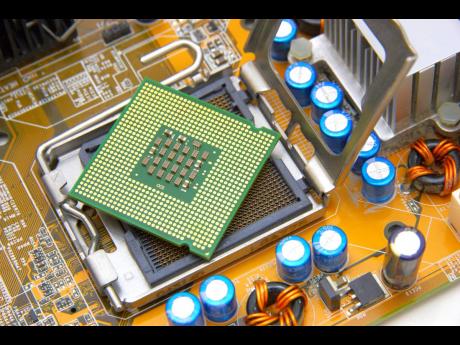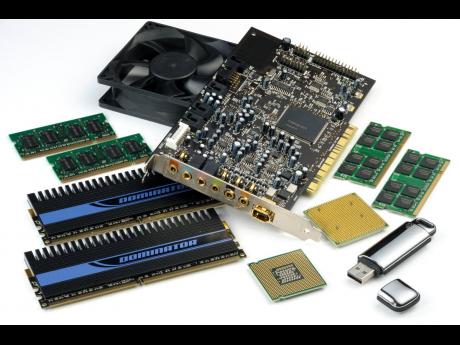Arnoldo K. Ventura | Can Jamaica ignore scientific and technological knowledge and still prosper?
Jamaican leaders have flirted with the idea of acquiring first-world status while experiencing intransigent socio-economic challenges. Is this possible without adequate scientific capabilities, especially in the fast evolving and competitive era of robotics, artificial intelligence, genomics and other biotechnologies, big data, and combinational technologies?
To answer this question, factors that enabled some countries to gain advanced economic headway are compared with what obtains in Jamaica.
ASSETS OF ADVANCED ECONOMIES
Countries that acquired economic distinction have consistently made investments in science and technology (S&T), educated cadres of skilled workers, conducted relevant research, and distributed the ensuing results with serious intent to deploy them.
They deliberately apply new technologies and scientific insights to their specific circumstances by participating fully in what is now referred to as the knowledge economy. This is typified by populations that actively create and use domestic and global information for development. They devise incentives for the creation, dissemination, and use of information as they facilitate effective networking, sharing, and learning. Most importantly, they are able to instil trust, self-confidence, and values that stress the centrality of S&T for development.
INVESTMENTS IN SCIENCE AND TECHNOLOGY – THE KEY
The old notion that land, labour, financial capital, and education are the main drivers of production is now considered dated in the reality that technological progress has been contributing up to 80 per cent of modern economic growth and human development. What is significant here is that the intellectual capital involved instigated positive feedback, fostering virtuous cycles of exponential growth. Consequently, it is now universally accepted that stable and adequate investments in S&T are clear predictors of economic success.
Of vital importance is that these investments were carefully directed by advanced societies to the translation and unfolding of S&T knowledge into new product designs to increase the range of services to fit customers and society’s changing needs as well as to find timely answers to social and environmental problems.
To do so effectively, they fashioned dynamic infrastructures that included research and development networks, scale-up and engineering systems, and pilot plants to ensure predictable implementation, coupled with informed and receptive financial and venture-capital establishments.
ABILITY OF SMALL ISLANDS TO CONSTRUCT VIABLE S&T COMPETENCE
Singapore, an island smaller than Jamaica, has achieved first-world ranking by consistent investments in S&T, up to two per cent of Gross National Product, and steadfastly encouraged relevant and imaginative research and innovation. Constant upgrading of goods and services, assertive export of high-technology products, as well as collaboration with the best in research and technological development are integral parts of their development strategies. Smallness, therefore, does not prevent the attainment of dynamic and effective S&T capabilities and ultimate prosperity.
This is in sharp contrast to what transpires in Jamaica, where S&T is, at best, merely tolerated and given token recognition, while growth is constrained by old, limited, and inefficient methods. Although a laudable S&T coordinating and management system was built, with a national commission, chaired by the prime minister, at its apex, it has not operated as stipulated in several years.
WAYS TO IMPROVE JAMAICA’S DEVELOPMENT
From the preceding analysis, improving the island’s socio-economic development dictates shifting from commodities and simple manufacturing to knowledge-intensive products and developing trade in high technology goods and services. This hinges on a national effort to actively build a culture of creative thinking and actions.
A chronic and palpable Jamaican problem is that of timely implementation of S&T results. Among the necessities to grapple with is the creation of specialised manpower. Preparing for such expertise, a distinction has to be made between those who do research and those entrusted with deploying the results of research.
It must be accepted that they possess different mindsets, timelines, and expectations. Clear plans, strategies, tasks, and responsibilities must be laid out, along with requisite funds and accommodating financial innovations. The private sector must be involved as an equal partner.
Jamaica’s lack of embracing science for socioeconomic development is not surprising as historically, science and its technologies were not seen as tools for domestic production or social enhancement. Feeble attempts at correcting these imperatives are now being undertaken without adequate S&T coordination and management to ensure application of scientific findings and transfer of technologies.
Furthermore, there are no comprehensive overall policies or plans for S&T and no sector plans to use these instruments to increase the quality or quantity of raw materials, semi- and finished goods and services.
Capital-goods facilities are limited, and pilot plants are few or totally absent in many sectors. Funds from commercial and development banks for technologically led or innovative projects are often unavailable or costly. The tendency is to rely on outside financing and accompanying experts for projects that are deemed essential for local development. The result is an underutilisation of talent and a constant drain of S&T graduates from the island.
A critical gap that constrains the use of new discoveries is the absence of communication channels that make relevant information visible, accessible, and translatable for public use.
Additional to the more structural hindrances outlined here, there is the tendency to interpret technology to mean information and communication technologies (ICTs) only to the almost total exclusion of other technologies.
Downplaying the less physically tangible and lesser-known technologies such as biotechnologies, genomics, and agricultural processing methods is drastically reducing options for development. It is the gaining of capabilities in these arenas that will enable innovations in food security, nutrition, water management, and health, among others.
THE ANSWER
The answer to the question, ‘can Jamaica prosper without making purposeful investments in the knowledge industry?’ is that it cannot. The more apposite question is, ‘can the island make the necessary commitments and investments?’ The answer is that it must. This, however, will rely on astute political vision, aided by the informed support and inputs of businesses and civil society.
Building a functional S&T infrastructure initially will depend on targeted government investments in science, education, training, and research. A key part of this endeavour is the encouragement of all sectors of society to embrace and participate in the generation and use of national S&T systems.
CONCLUSION
In building and using knowledge systems in Jamaica, success hinges on a more balanced, inclusive, and ethical economy. It must be recognised that mere knowledge is not power. rather, it is the effective use of information, which triggers workable knowledge capable of producing tangible solutions to relevant issues.
We must be mindful that education will not by itself transform Jamaica. It is the application of information that is provided by research that makes a country rich or poor. It is the quality of scientific information and critical thinking that a country applies to education and employment of graduates, decision making, production and environmental protection that makes the difference in how far a country will progress in its quest for socio-economic success.
In the present atmosphere of scientific indifference, S&T professionals have a clear responsibility to demonstrate that science is indispensable for our well-being.
[This article was adapted from an article originally published in the Caribbean Academy of Sciences Proceedings of their 21st General Meeting and Conference, 27-30 November, 2018, Kingston, Jamaica.]
- Dr Arnoldo K. Ventura is a student of science and technology for development for over 50 years and former special adviser to prime ministers of Jamaica. Dr Sandra M.E.Wint is a science and technology policy specialist interested in building capacity for sustainable development. The University of the West Indies Open Campus will offer a ten-week course in scientific technological knowledge for Caribbean Development, starting in May 2019. For more information, contact the UWI Open Campus via e-mail at jamaica.eastern@open.uwi.edu. Email feedback to columns@gleanerjm.com.


